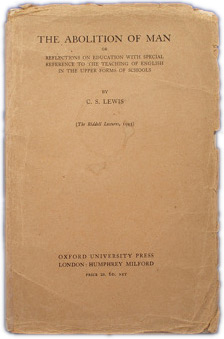
The Abolition of Man
The Abolition of Man is a 1943 book by C. S. Lewis. Subtitled "Reflections on education with special reference to the teaching of English in the upper forms of schools", it uses that as a starting point for a defense of objective value and natural law as well as a warning about the consequences of doing away with them. It defends "man's power over nature" as something worth pursuing but criticizes the use of it to debunk values, the value of science itself being among them. The book was first delivered as a series of three evening lectures at King's College, Newcastle, part of the University of Durham, as the Riddell Memorial Lectures on 24–26 February 1943.
Author
Moral subjectivism vs. natural law[edit]
Lewis begins with a critical response to "The Green Book" by "Gaius and Titius": The Control of Language: A Critical Approach to Reading and Writing, published in 1939 by Alexander ("Alec") King and Martin Ketley.[1] The Green Book was used as a text for upper form students in British schools.[2]
Lewis criticises the authors for subverting student values and claims that they teach that all statements of value (such as "this waterfall is sublime") are merely statements about the speaker's feelings and say nothing about the object.[3] Such a view, Lewis argues, makes nonsense of value talk. It implies, for example, that a speaker who condemns some act as contemptible is really only saying, "I have contemptible feelings."[4]
By denying that values are real or that sentiments can be reasonable, subjectivism saps moral motivation[5] and robs people of the ability to respond emotionally to experiences of real goodness and real beauty in literature and in the world.[6] Moreover, Lewis claims that it is impossible to be a consistent moral subjectivist. Even the authors of The Green Book clearly believe that some things, such as improved student learning, are truly good and desirable.[7]
Lewis cites ancient thinkers such as Plato, Aristotle and St. Augustine, who believed that the purpose of education was to train children in "ordinate affections", to train them to like and dislike what they ought and to love the good and hate the bad. Lewis claims that although such values are universal, they do not develop automatically or inevitably in children. Thus, they are not "natural" in that sense of the word, but they must be taught through education. Those who lack them lack the specifically human element, the trunk that unites intellectual man with visceral (animal) man, and they may be called "men without chests".